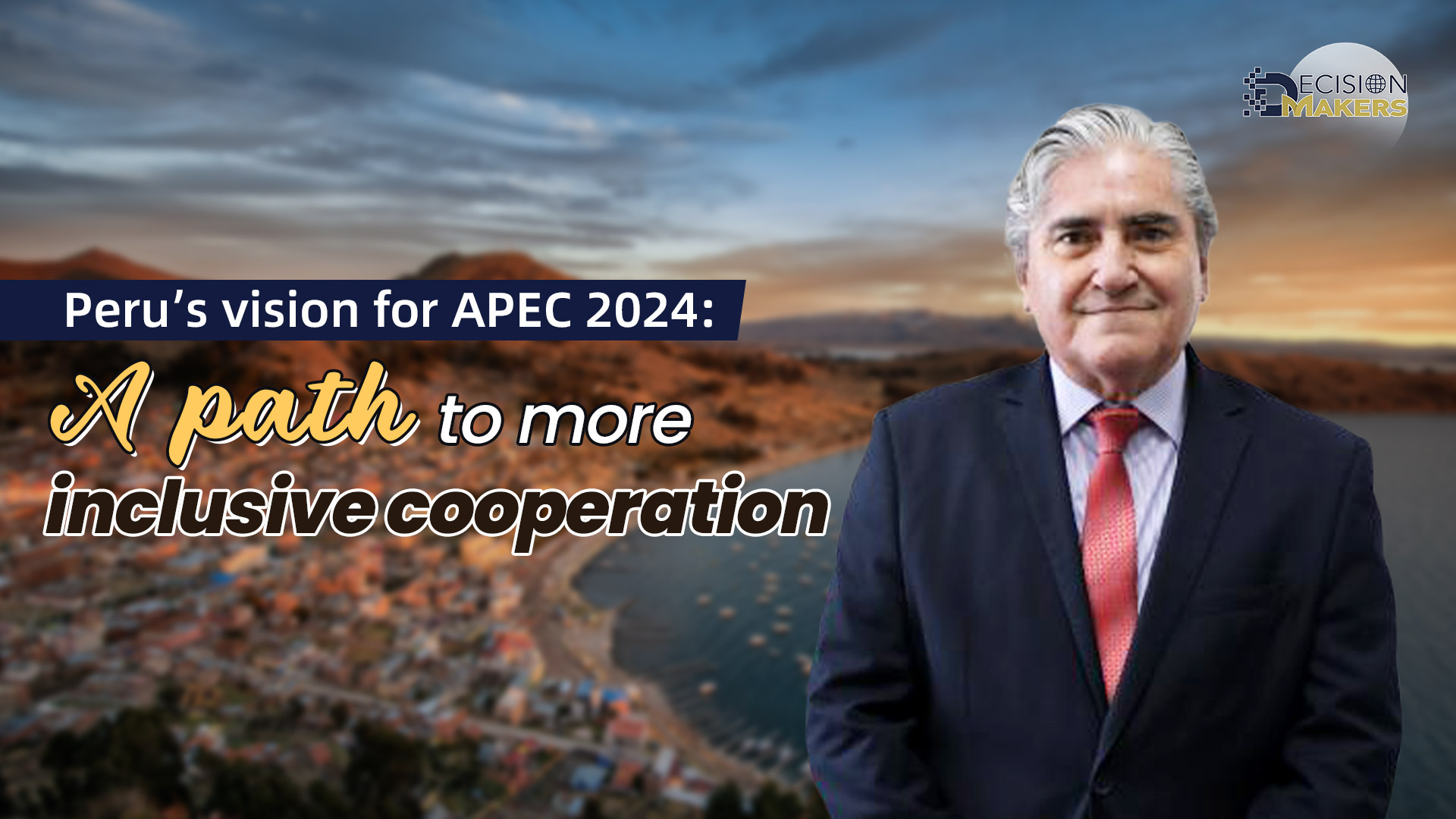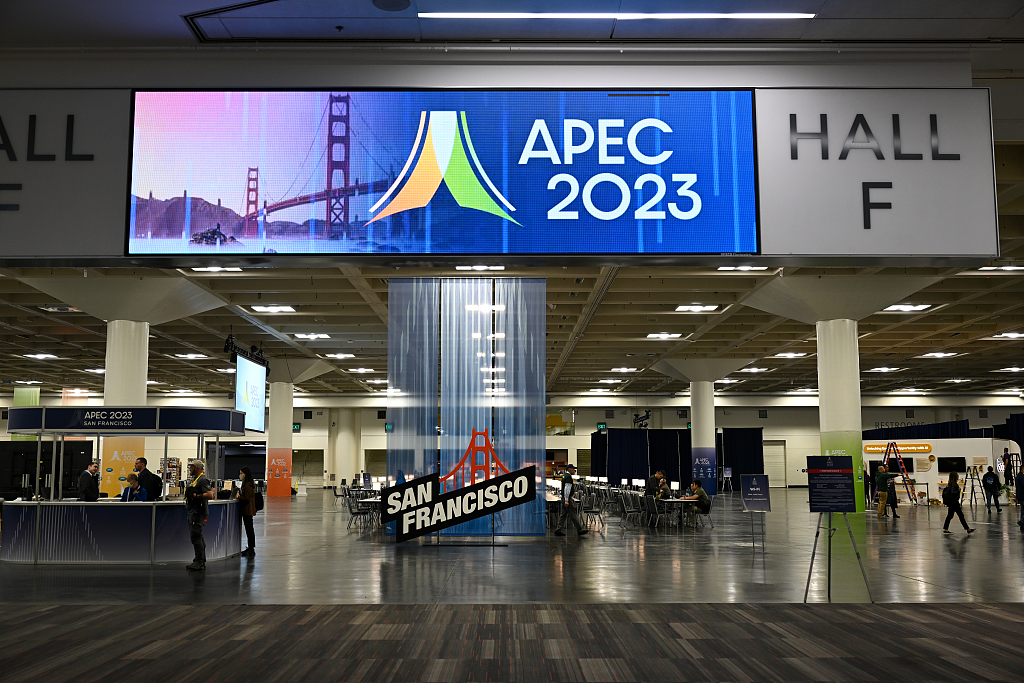
Editor's note: Decision Makers is a global platform for decision makers to share their insights on events shaping today's world. The 30th APEC Economic Leaders' Meeting with the theme "Creating a Resilient and Sustainable Future for All" is being held in San Francisco. Decision Makers has launched the "Inclusive Development for Common Prosperity" series to keep abreast with the latest developments. In this article, Marco V. Balarezo, Peruvian ambassador to China, shared his thoughts on this topic. The article reflects the author's opinion and not necessarily the views of CGTN.
APEC stands for the Asia-Pacific Economic Cooperation forum, established in 1989, and comprises 21 member economies that represent almost two-thirds of the world economy and nearly 50 percent of trade worldwide.
The primary goals of APEC are to create a more open and efficient economic environment, reduce barriers to trade and investment, promote sustainable economic development and engage in technical cooperation. APEC operates on the basis of non-binding commitments, often referred to as "soft law," emphasizing the importance of voluntary cooperation and consensus among its member economies.
Last year, APEC Economic Leaders met in person in Bangkok, Thailand, after a hiatus of almost four years due to the COVID-19 pandemic. The focus was on implementing the APEC Putrajaya Vision 2040, the Aotearoa Plan of Action, and the Bio-Circular-Green Economy model prioritizing a sustainable development model where resources are regenerated, and their use is optimized alongside the production processes.
Precisely, the meeting of this year takes place in San Francisco, United States, under the core themes of resilience, innovation, and inclusivity. It will be a new opportunity to further advance the key objectives of the forum towards an open, dynamic, resilient, and peaceful Asia-Pacific community by 2040.
During my time as Ambassador of Peru to the People's Republic of China, I confirmed that for China, it is important to strengthen APEC as a unique regional forum with the goals of supporting multilateralism and anchored in an open and norms-trade system with the World Trade Organization at its center, as well as deepening practical cooperation among its members in almost all sectoral fields. I look forward to seeing the outcomes of various ministerial meetings to analyze how the Putrajaya Vision 2040 and Aotearoa Plan of Action will continue evolving.
China, an active advocate for APEC, has injected powerful impetus into the development of the region. From the point of view of Peru, whose geography, economy, and even culture look to the Asia-Pacific as the center of its international projection and foreign policy in the region, APEC is the most relevant political space to further enhance the free flows of trade and investment and regional cooperation.
The 30th APEC Economic Leaders' Meeting in San Francisco is quite significant for Peru because our country will receive from the United States the Pro-Tempore Presidency of APEC for the year 2024. This will be the third time Peru hosts the APEC meeting, something not so many members can boast about, and I am deeply proud and convinced that we will be up to the task.

A screen displays the "APEC 2023" logo at the International Media Center at Moscone Center in San Francisco, California, United States, November 11, 2023. /CFP
A screen displays the "APEC 2023" logo at the International Media Center at Moscone Center in San Francisco, California, United States, November 11, 2023. /CFP
During the tenure of Peru's Presidency of APEC (2024), we are going to organize more than 160 ministerial and technical meetings in five different cities: Trujillo, Arequipa, (Urubamba) Cusco, Pucallpa, and Lima. Our three core objectives are: to prioritize trade and investment for inclusive growth; to promote the transition to the formal economy and the integration to global supply chains by innovation; and to pursue sustainable growth for resilient development.
During 2024, Peru is going to promote the initiative "APEC Citizen Peru 2024" to bring the benefits of the forum to the whole of civil society by creating dialogue spaces for students, entrepreneurs, guilds, and others. We look forward to many technology companies, including Chinese ones, helping us to develop events under such an initiative which is in line with the people-to-people policy.
Peru has also a high interest in promoting a "roadmap for the transition to the formal and global economy." In this regard, it will host a series of events for concrete outcomes, including workshops to understand the role of digital connectivity in the formalization process of informal businesses in the Asia-Pacific.
This concrete initiative has ample support from many member economies, including China. This in-depth study will help the public and private sectors, and academia in the APEC region to understand and develop strategies and models that facilitate business formalization in the context of digitization. This, in turn, will enable APEC economies, especially emerging markets, to set up policies promoting the transition to a formal economy, which used to be a malaise that hinders economic development and growth in many countries. For example, in Peru more than 70 percent of its economy is in the informal sector, which doesn't allow for an increase in fiscal revenues, improve the quality of employment and expand social protection and welfare to all, among other consequences.
In this sense, Peru will seek to build synergies with China and other APEC economies to strengthen SMEs' workforces, management, technological and methodology capabilities to insert themselves in global value chains and circular economy strategies.
In relation to the inclusiveness of all economic stakeholders, Peru plans to issue a joint declaration mandating the empowerment of women as fundamental economic participants and to ensure their inclusion in the formal economy, which in turn will also be incorporated into the "roadmap for the transition to the formal and global economy." The reason for this priority is clear: It is estimated that 600 million women work in the Asia-Pacific region, with about 40 percent in the informal sector. We must prioritize this sector if we want a more inclusive economic development.
These are some of the many initiatives that Peru is going to take. Until now, APEC has already approved the financing of 36 multisectoral cooperation projects presented by Peru for a fund of approximately $4.9 million. These initiatives, and others that will be developed during 2024, will contribute to the development of the thematic priorities of Peru as a host of APEC 2024. We look forward to walking the first steps during our assumption of the presidency in San Francisco.
(If you want to contribute and have specific expertise, please contact us at opinions@cgtn.com. Follow @thouse_opinions on Twitter to discover the latest commentaries in the CGTN Opinion Section.)



